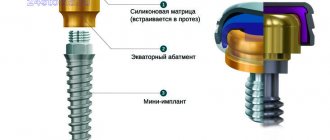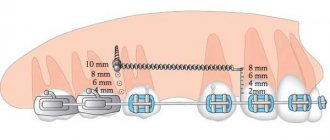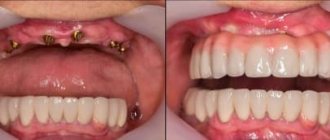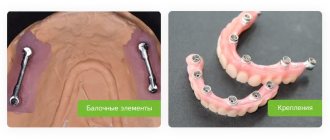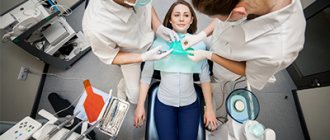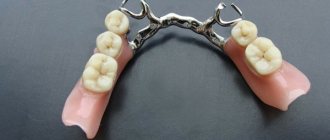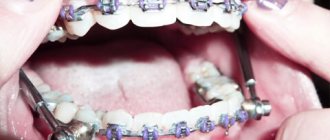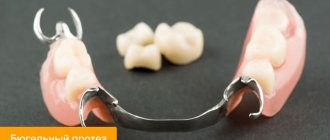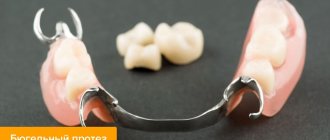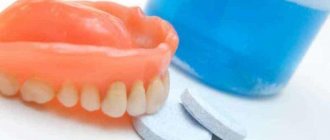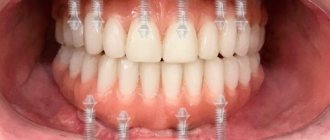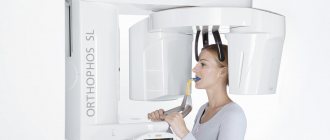About 50% of those who use removable dentures in everyday life indicate that the main problem in their use is insufficient strength of fixation in the oral cavity. This feature is the reason that when performing certain actions (eating, talking, laughing), the prosthesis can noticeably shift relative to its normal position.
To avoid such troubles, it is recommended to use special means that ensure high-quality fixation of dentures in the oral cavity.
Typically, when it comes to nylon and acrylic dentures, creams and gels are used. Gels are not inferior to creams in their functionality and differ from them only in consistency. Creams have a denser structure and are better suited for those who are just starting to use removable dentures.
Below we will consider the main means that are used for reliable and long-term fixation of dentures, their advantages and disadvantages.
ROCS
This drug was manufactured jointly by Russian and Swiss specialists and provides twelve-hour reliable fastening of the prosthesis, independent of the consumption of heated drinks and food.
Being distributed over the inner surface of the structure, this cream prevents small food particles from getting under the surface of the prosthesis. It should also be noted that the composition of this cream includes mint and menthol extracts, which significantly freshen breath and prevent the occurrence of unwanted odors.
Advantages
- Hydrophobicity. Cannot be washed off with any liquids.
- Lack of zinc element.
- Possibility of application to wet (not dried) dentures.
- The cream does not contain any artificial dyes or additives.
- Able to withstand the thermal effects of food, as well as drinks.
Flaws
- A high degree of thickness, which in some cases can complicate the uniform application of the cream.
- High price of the product.
In retail trade, the price for ROKS ranges from 250 to 400 rubles.
Lacalut
Lacalut is a product of German technology of traditionally high quality. This cream, according to manufacturers, is capable of providing reliable adhesion of the prosthesis to the oral cavity for a period of more than 24 hours.
The cream forms a protective layer between the patient’s mucosa and the prosthesis, which effectively protects the oral cavity from potential injuries and rubbing by the edges of the prosthesis. This is especially true for those who have just started using removable dentures.
Lacalut cream contains a substance called aluminum lactate, which has a pronounced anti-inflammatory effect. This cream can be applied not only to dried, but also to moistened removable dentures.
Advantages
- Provides gentle operation of prostheses, minimizing possible injuries and abrasions in the process.
- It has a pleasant taste and aroma.
- Provides reliable long-term fixation of the prosthesis.
Flaws
- There may be a slight weakening of the fastening strength during the consumption of various hot foods or drinks, such as tea or coffee.
- Relatively high price.
The cost of Lacalut adhesive cream ranges from 300 to 450 rubles.
How many implants are needed to install a prosthesis?
2 implants
To significantly improve the fixation of a removable denture, it is enough to install only two dental implants. After their “engraftment”, which takes 3-4 months, they are used as supports to hold the prosthesis. Special abutments are screwed to the implants, having locking fastenings in the form of a “ball” (Photo 3.2). The reciprocal part is fixed into the removable denture. When “putting on” the prosthesis, “the locks click into place” and it holds perfectly. In this case, it is possible to reduce the boundaries (sizes) of the prosthesis, sometimes significantly reducing the size of the plastic palate. Of course, the comfort and quality of life increases significantly.
Photo 3.2. “2 implants on the lower jaw for fixation of a removable denture”
Photo 3.3. "Removable dentures for the upper and lower jaw"
Photo 3.4. “Happy patient: good fixation, standard size prosthesis, beautiful smile.”
4 implants
If conditions allow the installation of 4 implants, it is possible to make a beam structure, that is, a removable denture on a beam . All implants are connected by a milled metal beam with locking “retaining elements”. The response part is located in the prosthesis.
Photo 3.5 “4 implants on the upper jaw + cast metal beam for fixing a removable denture.”
Photo 3.6. “Removable denture for the upper jaw: view from the outside and from the inside.”
Photo 3.7 “Removable denture for the upper jaw: view from the outside and inside.”
In this case, the design, in fact, resembles a bridge prosthesis (dental bridge), but unlike a bridge prosthesis, it is removable . The entire load is distributed to the implants. The fixation is very rigid, the prosthesis “holds tightly.” On the upper jaw, the artificial palate is completely absent. The boundaries of the prosthesis are reduced, which is very comfortable to use. A very beautiful and convenient option that allows you to remove and thoroughly clean the prosthesis outside and inside, as well as the beam itself.
Photo 3.8. “Happy patient: good fixation, reduced denture, beautiful smile.”
3.9 “Happy patient: good fixation, reduced denture, beautiful smile.”
But there is no limit to perfection. Using the same four implants, it is possible to manufacture a non-removable prosthesis using the “all-on-4” technique.
Photo 3.10 “4 implants on the bottom for fixing a fixed prosthesis.”
Photo 3.11 “The fixed prosthesis on the lower jaw is fixed. The patient is very satisfied."
Photo 3.12 “The fixed prosthesis on the lower jaw is fixed. The patient is very satisfied."
A separate article is devoted to this unique type of prosthetics.
6 or more implants
If you install from 6 to 8 implants, then it becomes possible to make a non-removable, comfortable, miniature and beautiful prosthesis, as close as possible in comfort and appearance to your natural teeth.
Photo 3.13 Complete denture for the upper jaw with complete absence of teeth supported by 6 implants.
Photo 3.14 “Happy patient: excellent fixation, miniature prosthesis, beautiful smile.”
You can read about fixed prosthetics in the absence of teeth here.
"Protefix"
The cream of this brand ensures reliable fastening of the removable structure for up to 14 hours. Three different types of this product are produced, one of which, due to the absence of any foreign dyes and flavoring additives in its composition, is hypoallergenic.
Advantages
- Complete absence of foreign tastes and odors.
- High reliability of fixation.
- Economical.
Flaws
- Due to its liquid consistency, the fixative may leak out of the bottle if it is not held strictly vertically.
- Not a particularly convenient dosing system.
The cost of this drug varies depending on the volume of the tube, usually ranging from 150 to 390 rubles.
Review of the best creams for fixing dentures: features of composition and application
Article navigation
- Why do we need fixing agents for dentures?
- The main components of creams that provide fixation
- Rating of the best creams
- 1. “Fittident” (Austria)
- 2. "Rox" (Switzerland)
- 3. "President" (Italy)
- 4. "Protefix" (Germany)
- 5. “Lakalut” (Germany)
- 6. Corega (Ireland)
- How to choose the most suitable product
- How to use the composition correctly
- Side effects of using the compounds
Question for a specialist
Most removable dental structures are attached to the soft tissue of the gums and palate. To prevent their loss, ensure reliable fixation and full performance of their intended functions, use denture cream. The product is suitable for wearing acrylic, nylon and silicone products. About which cream for dentures is better, the features of choice and the nuances of use later in the article.
"Fittydent"
"Fittident" is considered one of the best drugs for fixing dentures in the oral cavity , however, if the patient has increased sensitivity of the mucous membranes, then during the periods when "Fittident" is used, unpleasant sensations such as burning and/or characteristic tingling sensation.
To ensure that these side effects are avoided, after the cream is applied, let it dry for about half a minute.
Advantages
- Long fixation time provided by this drug.
- Lack of distinct taste.
- After removing the denture, no traces of cream remain in the patient’s mouth.
Flaws
- Difficult to find in city pharmacies in small towns.
- The cream must be applied exclusively to the dry surface of the prosthesis.
- Very thick structure of the drug.
The cost ranges around 270 rubles.
Fixing cream
Adhesive (fixing) preparations are available in the form of creams, powders or fiber pads. The most popular among them are creams that are produced on the basis of water-soluble polymer materials. They are easy to use, have additional antiseptic and aromatic properties and allow the patient to completely eliminate defects in the prosthetic device at the same time as more durable fixation. Manufacturers additionally add anti-inflammatory oils to some creams, which have a beneficial effect on the condition of the gums.
The principle of using a fixing cream is quite simple: immediately before applying the cream, you need to thoroughly rinse the prosthetic device and brush your teeth. Then a small amount of fixing cream is applied to the inside of the denture base. The device is placed on the teeth and pressed lightly for five to seven minutes. The adhesive preparation is completely compatible with biological tissues of the oral cavity, its composition is natural and does not cause allergies.
An essential feature that all patients need to be aware of is the condition of healthy gums. Any acute or chronic inflammation of the soft tissues of the oral cavity requires the owner of the prosthesis to temporarily refrain from using the orthodontic device and its fixing agents.
"The president"
The prosthesis attached with this drug tightly adheres to the mucous membrane due to the formation of an elastic layer of high density, which prevents food particles from entering under the surface of the prosthesis.
The consumption of hot drinks, as well as food, in some cases can lead to a weakening of the fixing strength.
Advantages
- Larger volume compared to analogues.
- High strength of prosthesis fixation.
- Low cost of the product.
Flaws
- Strong foreign taste.
- Eating can weaken (sometimes quite significantly) the fixation.
The cost of the drug is approximately 250 rubles.
"Korega"
All components of fixing preparations from this manufacturer are hypoallergenic and do not cause any side effects when used as intended.
Advantages
- Corega cream is equally suitable for use with both dry and wet dentures.
- It is characterized by low allergic activity and ease of use.
- It has a very low cost.
Flaws
- A short period of full fastening, which does not exceed four hours.
- Not waterproof, washes off quickly.
- It comes to an end pretty quickly.
- During the absorption of food, the prosthesis may fall out due to the dissolution of this product.
- If you use Corega cream for quite a long time, swelling of the mucous membrane may develop.
The average cost of this cream does not exceed 300 rubles.
We would also like to note that in case of any complications associated with the use of dentures, you should immediately contact the VivaDent clinic.
Recommendations for patients on the use of removable dentures
Dear patients, remain calm in the first days after the installation of dentures, remember that wearing dentures requires getting used to. It should be kept in mind that getting used to dentures is a gradual process. At first, you may have difficulty eating, your speech may become unclear, your sense of taste may change, and you may experience psychological uncertainty. At first, using removable dentures may cause a foreign body sensation, nausea, and increased salivation. Gradually, these phenomena will decrease as you get used to removable dentures. The main thing is to remember that all these sensations are normal, natural and surmountable. Almost all patients who have removable dentures go through similar difficulties, but following some rules and recommendations from your doctor will help you cope with these problems.
While in the dentist's chair, try to learn how to remove and put on the denture yourself. Then practice at home in front of a mirror, then without it. Before applying the prosthesis, you need to moisten it with water or use a fixative (if necessary). For increased gag reflex, mint or sour candies are recommended.
In order to better get used to the dentures and restore normal diction, it is recommended to read aloud (books, newspapers, magazines), and talk a lot.
You should not bite with your front teeth at first. Try to chew food with your side teeth at the same time (left and right at once). Food in the first days should not be solid. It is recommended to eat small pieces, even fruits and vegetables.
For the first 7 days you should eat only soft, pureed food.
Afterwards, you can move on to your normal diet that is familiar to you. We strongly recommend that you exclude very solid foods - crackers, nuts, etc.
For the first 7 days, do not remove the dentures at night.
If possible, wear them around the clock, removing them only for hygiene procedures. After this time, dentures must be removed at night!
For the first 7 days, dentures should be stored in a container with water.
After this period, dentures must be stored in an airtight container without water!
Please note that if you have pets, dentures should be kept out of their reach.
Complete adaptation to removable dentures will occur within two months!
Fixing agents.
Useful aids to help overcome the discomfort associated with wearing dentures are denture anchors. It is worth keeping in mind that the need for their use is determined by your attending physician.
There are 3 types of fixing agents:
Fixing gaskets. They are used for dentures of the upper and lower jaws and are usually recommended at the stage of getting used to the denture. Gaskets are especially effective for unfavorable jaw structure, age-related deformation of the gums, as well as atrophy of the alveolar process of the jaw. They are made of a soft, fibrous material and contain sodium alginate, which, when moistened, provides additional fixation of the prosthesis and protects against chafing and inflammation.
Fixing powder. Used for minor problems with dentures. The tasteless and odorless powder is produced on the basis of a substance of natural origin (sodium alginate). The fixing powder is convenient to take on trips; it is well tolerated and does not irritate the oral cavity.
Fixing cream. Used for complex problems with the fastening of prostheses. Recommended for reliable fixation of dentures with increased and normal salivation. It is easy to apply, retains its properties under the influence of hot and cold food, does not change the taste of food and drinks, and does not have a negative effect on the stomach. It is not washed off by saliva and is evenly distributed over the entire surface adjacent to the gum. Apply to wet dentures.
Caring for removable dentures.
- 1. We recommend storing dentures outside the oral cavity in a dry and clean sealed container. Before applying the prosthesis, you should moisten it in water and use a fixative (if necessary).
- 2. After each meal, the denture should be removed from the mouth and rinsed thoroughly under running water, using a brush to remove any remaining food. The denture must be clean!
- 3. Twice a day (morning and evening) clean the denture with toothpaste and a medium-hard brush (MEDIUM). It is advisable to clean dentures over a sink to avoid mechanical damage if they accidentally fall out of your hands.
- 4. You can use cleaning tablets, such as Protefix® cleaning tablets, which contain active oxygen. Without mechanically damaging the denture, they clean it and eliminate unpleasant odors, remove plaque and tartar, restore the natural color of the dentures and avoid infections in the oral cavity. We recommend that our patients use this method of hygienic care at least once a week if possible.
Correction of removable dentures.
- 1. 2-3 days after applying the prosthesis, you should see a doctor to monitor the fixation of the prosthesis.
- 2. If, while using dentures, severe pain occurs on the mucous membrane, then the dentures can be removed and consult a doctor for correction. The dentures should be in the mouth 2-3 hours before visiting the doctor so that the cause of the pain becomes obvious. The actual prosthesis correction procedure takes 5-15 minutes.
- 3. Do not adjust the prosthesis yourself! This may cause the prosthesis to break and void the warranty.
- 4. After correction of the prosthesis, you must not use it for 1-2 days. During this period, it should be used only to restore the aesthetics of the smile. During the healing period, it is advisable to rinse your mouth and take baths (hold the solution in your mouth) with herbal decoctions. Use a decoction of chamomile flowers, sage, oak bark, etc. For example, take 0.5 tablespoons of dry oak bark, brew in one glass of boiling water, cool, use the decoction 3-5 times a day.
Repairing dentures.
During the use of removable dentures, a fracture of the prosthesis or its individual parts (tooth, clasp, etc.) may occur. In this case, you need to contact the clinic. If a tooth(s) on which partial removable dentures are held or supported are lost, it is possible to weld an artificial tooth to the denture in place of the lost one. Repairing a removable denture takes 2-3 days. Repairs are made free of charge during the warranty period.
